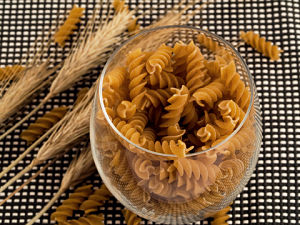Your bones have a cubby hole architecture. Bones are durable and resistant to breakage when the structural integrity of the cubby holes is intact. When the walls deteriorate, your bones become fragile and brittle. Calcium has very little to do with this process. Learn more in this video.
Posts Tagged ‘Plant-based nutrition’
Calcium Does Not Make Strong Bones
Thursday, July 8th, 2010Weight Loss – Success At Last
Sunday, July 4th, 2010Why Whole Foods Are the Key to Keeping Pounds Off
The obesity epidemic in the US remains a puzzle to researchers and policymakers. A widely publicized report issued in June 2010

Yes, you can enjoy pasta and still lose weight. Just choose whole grain pasta. It will take about 3 weeks for your tastebuds to adjust to its heartier flavor.
concluded obesity “threatens America’s future.” Both the health and financial costs are staggering and unsustainable.
In just the past year, the adult obesity rate rose in 28 states, falling only in the District of Columbia. If everyone were a healthy weight, Medicare costs would be 8.5% lower and Medicaid would be 11.8% lower.
There’s only one problem. The mainstream nutrition guidelines the report describes to get everyone thin don’t work. These dietary recommendations had the Federal stamp of approval for the last five years, yet obesity rates have skyrocketed in that time.
A complete change in how Americans eat is the answer. Half measures are basically (more…)
Your 70,000 Mile Traffic Jam
Thursday, June 24th, 2010All Your Cells Get Ideal Nutrition When Your Blood Flows Freely
The problem is that, on diets based on animal and manufactured foods, your blood vessels become clogged with plaque. This life-threatening process begins in childhood and progresses relentlessly. Cardiovascular disease is a leading killer throughout the world. You can stop and reverse this process so easily though – the key is your food choices.
Learn more at this Youtube video.
Blog posting by Janice Stanger, Ph.D. Janice authored The Perfect Formula Diet, a nutrition book built on sustainable food choices. Enjoy six kinds of whole foods for permanent, hunger-free weight loss and health.
Energy to the Max with Whole Foods
Saturday, June 12th, 2010Michele DeFilippo Finds Vitality and Diet Can’t be Separated
As the owner of 1106 Design, and an active player in the creation of book covers, interiors, and business logos, Michele DeFilippo
draws on physical and mental energy through long days and tight timelines. I met Michele when, impressed by 1106’s strong portfolio, I worked with her and her team on the cover and interior for The Perfect Formula Diet.
Several months later, Michele shared with me that she had decided to try the Perfect Formula Diet eating plan. This diet, based on whole plant foods, includes vegetables, fruit, beans, potatoes, whole grains, herbs, spices, nuts, and seeds. There are no artificial portion sizes. Instead, the diet balances the proportions of the different food types so you can eat whenever you are hungry and stop when you are full. The benefits for both health and permanent weight loss are impressive.
Here is Michele’s account of her experience with the Perfect Formula Diet.
Janice: What kinds of foods did you grow up eating?
Michele: I’m of Italian descent, so our diet was typically (more…)
Twelve Ways to Make Cooking Fun and Easy
Monday, May 31st, 2010Whip Up Health and Weight Loss Success in Minutes
Imagine if someone actually paid you to be healthy. Sent you a handful of dollar bills every morning to have fun. That’s what cooking
your own food is like.
Compared to eating out, cooking whole foods at home saves so much money that you can bank the difference. And even if you dread the task of preparing food now, a few simple insights and strategies can make the kitchen a favorite room.
In this era of manufactured, salt-drenched offerings in restaurants and supermarkets, cooking is a survival skill. If you flinch from preparing food, your health and weight will suffer.
Cooking is a major survival skill in the modern world. So you may as well learn to enjoy it. Here are twelve tips to get started on preparing your own home-cooked meals using (more…)
Whole Food Nutrients are a Superstar Team
Sunday, May 23rd, 2010Each Player on Its Own Can Do Little
No matter how well you eat, you may worry about your diet. You may doubt you are getting enough of certain nutrients. Iron, zinc,

With a superstar team, all players work together to win. Similarly, for whole foods, the benefit of all nutrients together is more than each taken on its own.
calcium, protein, omega-3 fatty acids…concern about these may hinder enjoyment of your food. Or maybe you are reluctant to begin a plant-based diet, because you are not sure if some critical nutrient is lacking.
We do not benefit from dissecting our foods into proteins, fats, carbs, calcium, iron, individual vitamins, and other components. The modern practice of taking food apart and worrying about each piece separately has led to bizarre eating patterns.
You may fret about lacking protein, or eating too many “carbs,” or not having enough “good fats.” So instead of eating whole foods, you then choose protein powder, neatly wrapped food bars, or bottles of oil. These foods narrowly focus on one or a few nutrients, leaving out most of the goodness of the entire plant.
Think of these manufactured foods as similar to a demolished building. You can live in an intact house, but won’t find shelter in a pile of bricks. Similarly, you won’t find the nutrients you need in (more…)
Not-Meal Plans: Permanent, Hunger-Free Weight Loss
Friday, May 14th, 2010A Whole Foods Diet Does Not Have to Be Bound to a Clock
Meal plans are a hallmark of most diets. You are expected to get hungry on cue, and wait until a specific time to eat again. If you
are famished between meals, you might be allowed a small snack – probably not enough food to satisfy.
Meals are a human invention. These prescribed times to eat serve to carve up the day, leaving long stretches to be devoted to work. Everyone gets synchronized on pretty much the same rhythm. This may be good for societal functioning, but is not so good for your body.
Hunger is a fundamental instinct and need. Your ancestors, foraging in nature, undoubtedly ate when they were hungry and food was available. Wild animals, living as nature intended, will eat off and on the entire time they are awake.
Your naturally perfect body knows when you need fuel and nutrients. Our understanding of nutrition and physiological
functioning is still far from complete. To second guess your body’s signals to eat is a recipe for failure in the long-run, and often even in the short-run.
The Perfect Formula Diet eating plan urges you to eat when you are moderately hungry and stop when you are full. If you wait until you are famished to eat, you are far more likely to let your appetite get out of control. The end result is that you stuff yourself with too much (more…)
Toxic Chemicals: How Little Do You Want to Know?
Tuesday, May 11th, 2010Cancer Panel Critics Portray Ignorance as Bliss
The President’s Cancer Panel, in the April 2010 report Reducing Environmental Cancer Risk, implores the nation’s scientists and policymakers to decisively address the potential harm from over 80,000 manmade chemicals. This call-to-action is dense with

There is no "away." All toxins end up on our planet, polluting air, water, soil, plants, animals, and us.
stunning facts and a willingness to question accepted wisdom. The document is clearly written, immensely readable, and more suspenseful than a mystery or spy thriller.
The Panel directly takes on some of the wealthiest and most powerful lobbies in the US. The chemical, agricultural, pharmaceutical, medical care, and medical research industries all face intense and direct scrutiny. The Panel also highlights the weakness of government “regulatory” agencies, which often do little more than rubber stamp industry requests at the public’s expense. The Panel even takes the military to task for its unchecked role in spreading carcinogens.
Yet the report is not sensational or strident in tone. It doesn’t have to be. The facts speak for themselves, and any extraneous commentary or criticism would only weaken the conclusions. Reducing Environmental Cancer Risk is meticulously researched, with 454 direct references and input from 45 experts from academia, government, industry, and advocacy groups who testified at Panel meetings.
You might think that it’s just common sense that toxic manmade chemicals may cause cancer and other serious health problems. You might believe that major scientific organizations would welcome investigation into this critical and poorly understood topic.
You would be wrong. Critics from the New York Times to the American Cancer Society have bashed the (more…)
Limiting Salt to Just the Right Amount
Saturday, May 1st, 2010Sodium Demonstrates That More is Not Always Better
In April, an Institute of Medicine (IOM) report once again highlighted the health consequences of eating too much salt. The report’s recommendation that the FDA should regulate salt in restaurant and processed food is news. Repeating information that the sodium in salt worsens high blood pressure merely reinforced what the majority of people likely already had heard.
The most important lesson hidden in the IOM report is the message that, in achieving ideal nutrition, more is not always better.
You may not realize that you do need some sodium, an essential mineral, in your diet.
When dissolved in a fluid (as it is in your body), sodium becomes electrically charged and is called an electrolyte. Sodium is essential for muscle and nerve function. If you lose too much sodium (for example, through heavy sweating), you may experience weakness, nausea, vomiting, cramping, and seizures.
Barring major sodium loss, you don’t need to worry about getting enough of this mineral. In fact, although the USDA recommends maximum amounts of sodium to eat, they do not even bother to suggest a minimum amount. You will get all the sodium you need on just about any reasonable diet.
Your kidneys actively regulate the amount of sodium and other electrolytes in your blood. When you eat too much salt, you make your body’s task of regulating these substances way more difficult, and health consequences may be serious. Cells are damaged by either too much or too little sodium in the fluid surrounding them. We all understand and accept the fact that, for salt, more is not always better. But you might not know that this general principle applies to all nutrients. The fact is, your body is an exquisitely delicate and complex system designed to work within narrow limits. Your body wants to maintain (more…)









